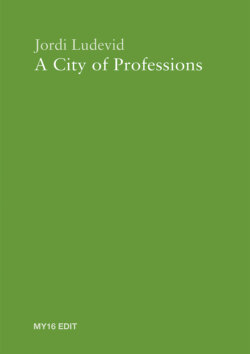Читать книгу A City of Professions - Jordi Ludevid Anglada - Страница 12
На сайте Литреса книга снята с продажи.
ОглавлениеI. La Resclosa dels Manresans (13th century)
The origins, the zero point, the source of the canal and the path
of the water, an initial control and a transverse route.
I. Introduction
Today, professional activity directly affects more than two million members of professional associations in Spain, more than 350 million in the world. They make up 4.3% of the total Spanish population and 25% of the working population. If we add those professionals who are not members of a professional association, the figures double. And if we also consider those working in the many trades that are now considered professionals, the figures are even higher. Thus, the group ultimately makes up a very large, unsuspected, decisive majority, which easily exceeds 50% of the working population – and of voters – in large cities all over the world.
Professionals are not, therefore, a minority; they are a central core component of the middle classes and of society as a whole. As Talcott Parsons states, «the professional complex, although incomplete in its development, is already the most important component of the structure of modern societies.»1 And yet, despite all this, the professional complex is still largely being neglected, if not blatantly ignored or even undermined.
In recent decades, there have been very few studies undertaken from within the professional world itself. In fact, they have been practically non-existent.2 However, it seems clear that reflections «from the inside» would offer a less disciplinary or academic vision; and although it might be less specialised, the perspective would be inspiring and much more practical and holistic, and more political.
In any case, if professionalism as a democratic virtue were recognised as a crucial, truly essential social need, as no doubt it should be, this recognition would soon be extended to professionals and professions, leading to a reconsideration of the professional fact as a whole.
However, a number of disturbing questions come to mind, chaotically and in droves, in the face of this panorama: Do governments today guarantee the economic, social and educational rights of their professionals? Aren’t the serious problems they are facing today also urban and global problems, social and political problems? Aren’t the same problems experienced in other similar realities such as by the self-employed, small and medium-sized businesses, and civil servants? And, besides, isn’t every city and every neighbourhood a site for the action, interaction, and amalgam of the practice of the different professions? And aren’t the professions today practised within a globalised network society and in a completely different context? Finally, have national governments and cities around the world ensured the continuity of know-how and craftsmanship, trades and professions during the period from the 19th century to the present day?
One thing is clear: in the face of social emergencies and pandemics, the professions always rise to the challenge. But why do we only remember them in a crisis? What is a profession? How does a mere technician or expert differ from a professional? Is the professional fact relevant today in a world of cities and at a time that is completely conditioned by digital disruption and a public health crisis? What does it mean to say, «We are not heroes, we are professionals»?
Curiously, seeking out and finding answers to these troubling questions requires an unknown, long, uncertain and intense journey of discovery, not only into the past, but also into the very different, and sometimes dramatic, context in which professions and trades are practised around the world today.
1 Talcott Parsons (1902-1979) was an American sociologist who continued the work of Max Weber and Émile Durkheim, arguing that professional activity fundamentally shaped modern liberalism.
2 A recent reflection, somewhat difficult to categorise, seems to have been come from close to the professional world, although it does not have great faith in its future: The Future of Professions, by Daniel and Richard Susskind, Oxford University Press, 2015. In response, the psychologist Howard Gardner opened an interesting debate at Harvard University: Is There a Future for the Professions? An Interim Verdict, Harvard University, 2015, available at: https://howardgardner.com/2015/12/11/a-future-for-the-professions/.
